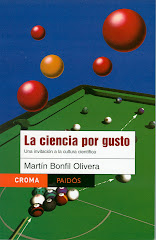Published in Milenio Diario, July 28, 2010
 The other day, I was talking to a friend and mentioned something about the Big bang theory, and the inevitable reference turned up: "yo mean the TV show?".
The other day, I was talking to a friend and mentioned something about the Big bang theory, and the inevitable reference turned up: "yo mean the TV show?".
The thing is, The big bang theory, the wonderful sitcom that debuted in 2007 and has turned into a world success, represents a conflict for people, like this columnist, who have a scientific education.
On the one side, it is really good. It has endearing characters, among which the problematic Sheldon Cooper stands out, a theoretical physicist with two PhDs, and an IQ of 187, whose total lack of social abilities, humor and modesty (there are people who think that it has a slight form of Asperger's syndrome, a type of autism) makes him unbearable, cute and very funny, all at the same time.
Together with his friends Leonard, Howard and Rajesh, Sheldon works in the prestigious CalTech (California Institute of Technology), in Pasadena, and the adventures of this quartet obsessed with science and technology –but also with comics and other elements of geek culture– make every chapter a mixture of references to scientific theories and concepts –which are surprisingly accurate: the program has good scientific advisors– combined with very funny situations. A true delight for people who, beyond comedy, can appreciate the scientific jokes and references (even George Smoot, Physics Nobel laureate in 2006, of whom we talked here last week, participated in a small sequence at the end of one of the chapters).
But, on the other hand, the sitcom presents a series of stereotypes against which the science community has fought for a long time: it shows scientists as antisocial beings, misfits, geniuses but incapable of doing the easiest tasks, obsessive, absent-minded, ultra-logic and humorless.
Actually, scientists are just human beings… although, as anybody who lives near one –physicists, in particular, or even worse, mathematicians– can testify, all these stereotypes have a certain measure of truth. Maybe that's why we scientists love The big bang theory, even though sooner or later we have to pay the price of having our friends tell us that we're just like Sheldon.
(translated by Adrián Robles Benavides) To receive Science for pleasure weekly
in your email, subscribe here!



